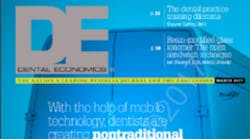Next-generation dentists
Ken Rubin, CPA, PFS, profiles what he calls "next-generation dentists," new dentists who have entered the profession with competitive business skills distinct from those of their predecessors. Established dentists, take note—the business of dentistry is changing.
Next-generation dentists are inheriting the dental world. They are able to build large, successful practices quickly. The paradigm has shifted, and unfortunately many of the more established dentists did not get the memo.
Next-generation dentists have zero problems starting practices from scratch in the right locations and ramping up high production in just one year. They are able to accomplish in one year what might have taken today's seasoned dentists 20-plus years to do.
These dentists know how to leverage dental technology to perform high-quality dentistry. They know how to successfully compete with larger group practices. They grew up with the Internet during the Information Age and have instant access to whatever information they want.
Next-generation dentists understand that the best investment they can make is in themselves. They are lifetime learners who embrace and adapt to change easily. They eagerly learn to perform a wider variety of procedures, to perform procedures more quickly, and to polish their case presentation skills in order to increase acceptance rates.
Rather than focusing on the dollars they spend, they are not afraid to invest when a high return is likely. They understand that the right advisors are worth their weight in gold. These dentists don't choose advisors because of big-name recognition or flowery promises to solve problems and make life great. They understand that the most important thing in selecting advisors is to check with peers who have had recent positive experiences.
Unlike their peers of yesteryear, next-generation dentists work to avoid being sitting targets for the ever-prevalent threat of embezzlement. And unlike their peers of yesteryear, many are wising up and purchasing the physical locations of their practices, such as office condos and buildings, rather than falling into the traditional trap of being tenants and making lessors rich. They realize that it's foolhardy to miss out on 30 years of real estate appreciation and dump hundreds of thousands of dollars into making leasehold improvements to a piece of real estate that somebody else owns.
In the good ol' days, the more established dentists simply did not have to run their dental practices in a businesslike manner. The next-generation dentists "get it," and they are operating their businesses like businesses. In fact, many of them are going a step further by taking advantage of the concept of scalability. Once they have systems in place in one practice location and that practice functions with little of their own involvement, they increase the scale of their business ventures and duplicate their success with more locations.
Paradigm shifts happen! Living in Southern California, I have noticed that trends in dentistry really do seem to start here and then work their way (usually slowly but very consistently) across the nation. Be sure that you are keeping up with the rapid changes in the business of dentistry so you do not get left behind. If you lack the necessary business skills needed to thrive in today's competitive business environment, seek out the help of reputable advisors to help you.
Ken Rubin, CPA, PFS, has been helping dentists improve their practices for 30 years. He is a frequent author and lecturer, and he is the cofounder of the Academy of Dental CPAs (ADCPA). His CPA and business advisory firm, Ken Rubin & Company Dental CPAs, helps dentists with practical and proactive advice. He can be reached at (619) 299-6161 or [email protected]. Visit his website at CaliforniaDentalCPAs.com.
